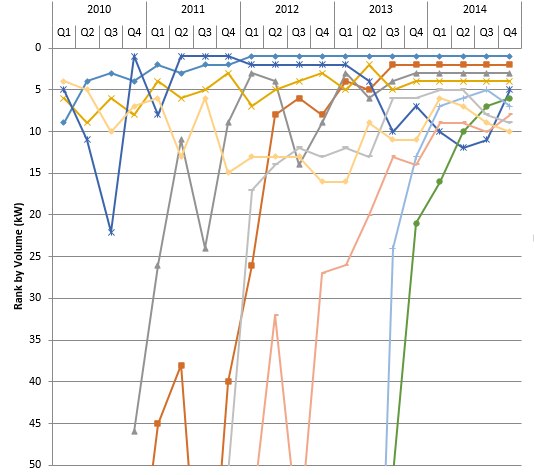Market Insights January 2015
Post on: 18 Июль, 2015 No Comment

Investment Insights
How has the Indian equity market changed in the last few years?
The last few years have been a fairly challenging period for India, characterised by lower industrial activity, increased subsidies and increased fiscal and operational deficits. The Indian equity market was probably not the best choice for investors before 2014. The main reason being the inability of the previous government to take any concrete actions to address these issues, especially at a time when emerging markets by themselves were off Institutional Investors’ radars. Some reversals may be in the works in 2014 – A new Government1 with an absolute majority is now in power. Lofty expectations for better governance and predictions of dynamic GDP growth and corporate earnings have pushed markets to an all-time high.
How do you see the markets now? Are things slowing down, or speeding up?
The markets always tend to follow big economic events. The new Government is focused on speeding up and implementing critical projects and policy changes. Nevertheless, contrary to the widespread expectations of revolutionary reforms, all changes have been incremental. This is what is to be expected from the new Government when implementing its plan for reviving the economy. Nothing radical just make sure it works.
How do Modi and the stability that comes with this change in government affect the markets?
The new Government’s biggest change is its ability to make tough decisions because of its simple majority in the center. The markets have responded by hitting all-time highs. A lot still needs to be done to bolster the growth of the Indian economy. A fair estimate is that early 2016 should see some absolutely positive macroeconomic results. If that happens, equity markets should continue to be quite rewarding for investors.
What sectors will Modi and governmental policy change affect the most?
The Government is focusing on restarting all investments that stalled for either legislative or financial reasons. The emphasis on productivity and jump-starting the cash flow cycle for Indian industry would benefit companies across multiple sectors. The Government seems to be emphasising the competitiveness of Indian manufacturing internationally and at the same time, creating domestic demand. Agriculture and Infrastructure are two sectors that are likely to be bullish in the short term.
What are the key sectors for growth?
While Agriculture and Infrastructure will benefit from Government policies and funding, they would also be instrumental in driving employment opportunities for India’s large population. It will take some time for capacity in these sectors to wear themselves out, thus profitability could take some time to rear its head. India’s long-term growth opportunities remain the country’s dynamic demographics and strong consumer spending.
Will all sectors be affected positively? Are there any losers going forward?
If growth were to start up again, it would benefit almost everyone. The only caveat out here is the strength of the currency. India cannot afford to have a strong currency but if there remains significant optimism for the country, it might be difficult to maintain a depreciating currency. This could impact a significant number of export-oriented companies.
What are the main roadblocks towards growth in the next year?
India should be able to grow by 5/5.5% in 2015. Over the last couple of years, the environment has become more and more driven by the central bank and therefore, any change in monetary policy may impact the economy on a short-term basis. Domestically, inflation, which posed a serious concern up until a few months back, has started to drop. This is the first time that the fall in inflation seems sustained and durable due to the proactive measures taken by the government and the fall in global commodity prices.
What other factors are affecting the Indian equity markets, besides the change in government?

Corporate earnings bottomed out in the 2014 fiscal year. This, paired with Industry’s record debt levels, pulled a 180 degree turn as early as March 2013. Earnings momentum should positively influence markets and this should move to higher, teen-level growth.
Disclaimer:
MUTUAL FUND INVESTMENTS ARE SUBJECT TO MARKET RISKS, READ ALL SCHEME RELATED DOCUMENTS CAREFULLY.
The Disclosures of opinions/in house views/strategy incorporated herein is provided solely to enhance the transparency about the investment strategy /
theme of the Scheme and should not be treated as endorsement of the views / opinions or as an investment advice. This document should not be construed as a research report or a recommendation to buy or sell any security. This document has been prepared on the basis of information, which is
already available in publicly accessible media or developed through analysis of IDFC Mutual Fund. The information/ views / opinions provided is for informative purpose only and may have ceased to be current by the time it may reach the recipient, which should be taken into account before interpreting this document. The recipient should note and understand that the information provided above may not contain all the material aspects relevant for making an investment decision and the stocks may or may not continue to form part of the scheme’s portfolio in future. The decision of
the Investment Manager may not always be profitable, as such decisions are based on the prevailing market conditions and the understanding of th e Investment Manager. Actual market movements may vary from the anticipated trends. This information is subject to change without any prior notice. The Company reserves the right to make modifications and alterations to this statement as may be required from time to time. Neither IDFC Mutual Fund / IDFC AMC Trustee Co. Ltd./ IDFC Asset Management Co. Ltd nor IDFC, its Directors or representatives shall be liable for any damages
whether direct or indirect, incidental, punitive special or consequential including lost revenue or lost profits that may arise from or in connection with the use of the information.














